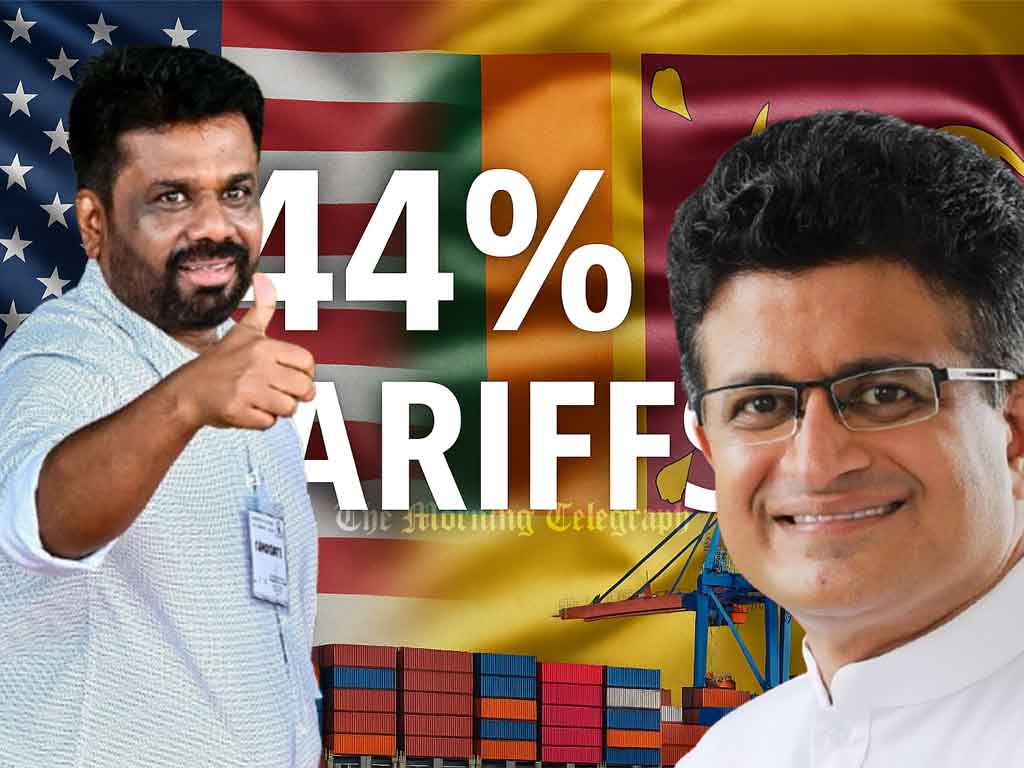
Colombo, Sri Lanka – The leader of the Pivithuru Hela Urumaya and senior lawyer, Udaya Gammanpila, has warned that Sri Lanka is heading toward a devastating economic crisis due to the government’s failure to respond proactively to a recent hike in U.S. tariffs on Sri Lankan exports. Speaking at a press conference at his party headquarters, Gammanpila described the situation as more dangerous than the 2019 Easter Sunday bombings, stating that the government has grossly underestimated the scale of the threat.
According to him, the U.S. government, under President Donald Trump, announced on April 2, 2025, that it would impose a 44% import tariff on Sri Lankan goods. The increase is part of a broader economic strategy by the Trump administration to address the U.S.’s massive global trade deficit. In 2024, the United States exported goods worth $3.2 trillion but imported $4.1 trillion, resulting in a $900 billion trade gap. Trump, during his presidential campaign, had vowed to impose equal tariffs on countries that place high tariffs on U.S. goods—a move dubbed by media as “tit-for-tat” tariffs.
Gammanpila pointed out that Sri Lanka is now one of the countries hit hardest by these new tariffs. In fact, only a handful of nations—including Cambodia, Laos, Vietnam, Madagascar, and Lesotho—face higher tariffs. The 44% tax was not arbitrarily decided but calculated based on trade data. In 2024, Sri Lanka exported $3 billion worth of goods to the U.S. while importing only $368 million in return. This created a trade imbalance of $2.632 billion, which, when divided by the export total and multiplied by 100, gives a trade gap of 88%. According to the U.S. formula, the new tariff rate is 50% of that figure—resulting in the 44% tariff imposed on Sri Lankan exports.
Gammanpila stressed that this development affects Sri Lanka more than most other nations. While India sends only 10% of its exports to the U.S., and Bangladesh about 15%, 25% of Sri Lanka’s total exports go to the American market. The impact is especially severe on the garment industry, which sends 42% of its products to the U.S. Sri Lankan products such as garments, tea, coconuts, and cinnamon will now be more expensive for U.S. consumers, who may turn to cheaper alternatives from other countries not subject to such high tariffs. As a result, he warned, Sri Lankan garment manufacturers may shift production to countries with lower tariffs, leading to a loss in foreign revenue and mass unemployment.
Gammanpila questioned what would happen to industries such as tea and coconut, which are deeply rooted in the country and cannot simply relocate overseas. He described the unfolding situation as a crisis “unprecedented in history,” warning that these economic tremors are far worse than the shock caused by the Saharan terrorist attack. The effects of this tariff hike are already being felt, he said, as Sri Lanka risks a foreign exchange shortage, declining exports, and increased joblessness.
He further criticized the government for failing to act despite early warnings. Trump had indicated as far back as September 2024 that he would introduce these tariffs. When he took office in January 2025, his administration immediately imposed tariffs on major trade partners including Mexico, Canada, and China. Other countries responded swiftly. India, for example, purchased arms and natural gas from the U.S. to reduce its trade deficit, while China looked for new export markets. Sri Lanka, however, remained passive. No mention of a response strategy was included in the President’s 2025 budget speech. Instead, the government focused on criticizing the opposition, ignoring what was an emerging economic emergency.
Gammanpila recalled that when the current President was in the opposition, he would often appeal to U.S. Ambassador Julie Chung for support over minor issues. Now, faced with the most serious economic crisis in recent memory, he has remained silent. He said it is now the President’s duty to once again approach Ambassador Chung—not for sympathy, but to initiate meaningful negotiations with the U.S. to reduce tariffs and restore balance to Sri Lanka’s export economy.
He urged the government to begin immediate talks with the United States to reduce the trade deficit by increasing imports, as India did, and simultaneously explore new export markets and product diversification. He emphasized that garment exports can relocate, but Sri Lanka’s agricultural products cannot. Without swift diplomatic and economic action, Gammanpila concluded, the country faces the real danger of falling into recession—a crisis that could have been prevented with proper foresight and planning.




